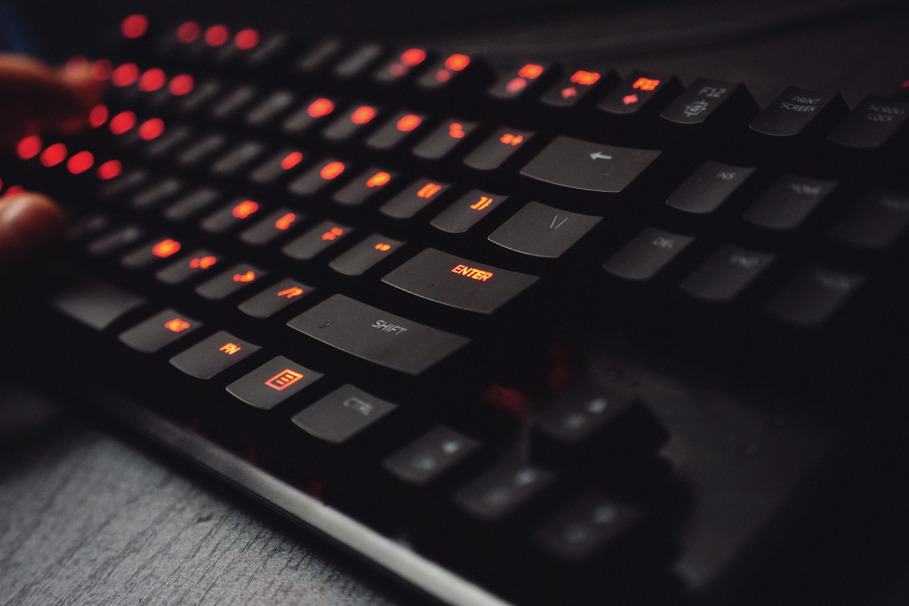In this post we compare the key differences between a mechanical vs membrane keyboard, and help you choose the right type for you...
Do you spend a lot of time on your computer? If yes, then you would want all your computer parts to be user-friendly and comfortable even after a whole day of using it. Of all of your computer paraphernalia, the mouse and the keyboard are just as important as your monitor. You do not want to suffer from tired hands and fingers because of cheap and low-quality keyboard and mouse.
When it comes to your keyboard, you want one that does not just feel good, but also works great with your fingers. For many, they have to choose between a mechanical and a membrane keyboard, which are vastly different in function and performance.
What Are Membrane Keyboards?

Most of the keyboards out there are membrane keyboards. The name comes from the thin membrane that will press on a circuit layer every time you press a key. Each key has a pressure pad that will make contact with the circuit layer.
There are 2 designs under membrane keyboards. First is called a flat key, like what you would see on a microwave oven. They have pressure pads but do not give any physical feedback (which can be important when you are typing). The second is the dome switch keyboard. As the name suggests, it makes use of rubber or silicone domes that simulate the spring structure much like in a mechanical keyboard. When the domes get pressed down, they will collapse and make contact with the circuit.
Pros of Membrane Keyboards
Maybe it is the lasting legacy of typewriters, but the physical feedback of typing is familiar. Dome switch keyboards provide this, although they tend to be quieter compared to mechanical ones. But they are more portable and light, due to the fact that they are usually made of plastic. One last (but just as significant) advantage is that they are more affordable due to the older technology and the cheaper materials.
Cons of Membrane Keyboards
If you like a soft, easy-to-use keyboard, then membrane keyboards might not be for you. They require some effort and the keys need to be pressed on harder compared to mechanical keyboards. It may also happen that letters do not get typed because it was not pressed down hard enough. If you are a quick typist, then this is a clear disadvantage and you might have to recheck and retype your work.
Membrane keyboards technically have a long lifespan, but they tend to get worn out faster compared to mechanical ones. It means they will still work but the keys have a mushy feeling after a while. Lastly, cleaning is much more difficult because you cannot remove the keycaps.
How About Mechanical Keyboards?

Mechanical keyboards use real switches in order to send signals when you are typing. There are also a few kinds of switches with their unique way of working. Each key has its switch, as well as a base, spring, and stem. Another thing that sets them apart is that the keycaps are easy to remove and move around. Plus, they have the most physical feedback of all keyboards out there.
It is important to note, however, that mechanical keyboards can greatly vary from one brand or model to another. This is because they are very customizable, beginning with the kind of switch used in the keyboard itself. They are typically available in 3 types: linear, tactile, or clicky. Linear ones are the smoothest while tactile switches have a bump at the actuation point (or the middle of the keystroke). Lastly, clicky is the type that makes a clicking sound when you type.
Switches can also vary in color, with blue ones the most common and most recommended of all colors. But the best thing about mechanical keyboards is that you can find the best option for your purpose. If you are a gamer, then they have switches with faster keystrokes. For offices, there are models that are quieter.
Pros of Mechanical Keyboards
The biggest advantage of mechanical keyboards is the fact that they can be customized. You can remove and replace the caps as much as you like. Without the membrane layer that affects the physical feel, they are not prone to wearing out as quickly.
The typing experience is also a huge plus - they have higher tactility so that the keys do not need to be pressed down too hard. You do not need to exert as much effort in typing and you save time from checking whether your strokes register (which is a huge thing when you have to work the whole day on the computer). Pressing multiple keys is also possible, and lastly, removable keycaps allow you to clean them more thoroughly.
Cons of Mechanical Keyboards
This kind of keyboard is heavier compared to others, most likely due to the materials and technology. Not only are they less portable but they can be pricier as well (especially when specific kinds of switch are used). Do you love the sound of the typewriter? Then mechanical keyboards are perfect for you because some of the models can be louder than usual.
Which One Is Better?

After making a comparison between the two kinds of keyboard, do you know now which one to buy? The answer lies in your purpose or use of the keyboard. Membrane keyboards are best if you do not spend so much time on the computer or need something portable.
On the other hand, mechanical keyboards are for permanent locations like your office or your gaming desktop. Plus, the latter is clearly the better choice if you need to type or press on certain keys a lot. You will then benefit from the durability and ease of use.
While they tend to be more expensive compared to membrane keyboards, there are models that do not cost that much more. This is the beauty of the customizable mechanical keyboard. Not only will you find the best configuration for you, but you will also find one in exactly your price range.




